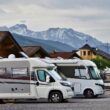Contents Show
Im Foreign countries not only apply to others Traffic rules. Also at Accident handling, Police checks or Driving license law there are differences to Germany.
Who this year Vacation does abroad, likes to do it by car. This guarantees mobility and flexibility, especially in the pandemic. However, there are a few things to consider when driving on unfamiliar roads. Questions and answers.
Which rules apply in road traffic?
Different countries, different customs: those who inform themselves in advance about the traffic regulations of the holiday country avoid expensive parking tickets and trouble with the local police. Speeding, for example, can be significantly more expensive than you are used to in Germany. The prescribed maximum speeds for the motorway, country road or city should therefore be taken seriously. Disregarding parking regulations or requirements for environmental zones are also expensive. Calling with the mobile phone while driving without a hands-free system also costs hefty fines in many countries. In some countries you also have to observe special regulations: glasses or contact lens wearers always have to carry a replacement with them in Spain, for example. In Italy, daytime running lights or dipped headlights must be switched on at all times of the day and night. France requires a breathalyzer on board. Smokers also have to be careful. Anyone who is used to smoking their underage children in the car in this country can be fined heavily in Austria, France or Italy.
Where do I need an international driver's license?
When driving outside the EU, Germans should have an international driver's license with them. You can apply for it for 15 euros at the road traffic office. You have to present your identity card, a biometric photo and the EU driving license in credit card format. Anyone who has an old gray or pink driver's license must exchange it beforehand. After issuance, the international driving license is valid for three years. The international driving license is recommended not only for many countries outside Europe, but also for some countries on the continent, such as Albania, Moldova, Russia, Ukraine and Belarus. It is compulsory in many non-European countries such as Brazil, Namibia, South Africa and Singapore. There it must be presented as an additional document to the national driving license during a check. It is not valid as a single document. According to the respective national criminal regulations, a prison sentence may even be possible when driving without an international driver's license. The international driving license is not required in the EU countries or in Norway, Liechtenstein, Iceland and Switzerland.
What to do in the event of an accident
A traffic accident in a foreign language abroad is a nightmare for many car vacationers. As a rule, however, you can also make yourself understood without language skills if you follow the behavior that is usual in Germany. Even when you are abroad, you put on a safety vest before getting out of the car, in many countries this is even compulsory. Another standard measure is to secure the accident site with the warning triangle. In the next step, the accident should be reported to the police. In many countries, the authorities can be left out in the event of minor damage, but in case of doubt you are on the safe side. In Poland and Romania it is even mandatory to report every accident to the police. For the documentation of the incident, the European accident report previously deposited in the glove compartment should be filled out carefully. The accident is logged using this form, which is standardized in terms of content and graphics. It can be ordered as a carbon copy from any car insurance company, and it can also be downloaded from the Internet. In the Benelux countries and France, the European accident report is binding. With the signature, the content is irrevocably recognized. Therefore, any comments or contradictions should be entered under point 14. If the parties involved in the accident do not agree on the course of events, they should each fill out their own report, sign it and exchange the copies.
How do I behave during a police check?
In principle, the same rules apply as in Germany. If you are waved out, you should bring the vehicle to a safe and slow stop. If music is playing, it is advisable to switch it off or at least to turn it quietly. In the dark you can also turn on the interior lighting, because that shows that you have nothing to hide. When talking to the officials, calmness and objectivity are recommended. In case of doubt, only the bare essentials should be spoken. It is better to save yourself aggressiveness, discussions and attempts to distract yourself. The co-drivers should also stay out of communication as completely as possible. Politeness and respectful behavior generally lead to more accommodating behavior on the part of officials. However, this also depends on the severity of the allegation. There are also special features if you are suspected of being drunk. While it is quite safe to refuse a breath alcohol test at a traffic control in Germany, in other European countries there are sometimes high fines or even imprisonment if you refuse the control. The ADAC therefore advises you to always take the test into account.
How do I protect myself from criminals?
Holiday travelers are good prey for crooks and con artists abroad. Anyone who goes on vacation by car or mobile home should therefore take a few tips to heart to be on the safe side: Bikes should always be connected - including on the bike rack. You should clarify in advance whether there is insurance cover for your bike. In the event of theft, you have to inform the police immediately, you will need a corresponding file number later to settle the claim. The serial number of the bike, photos and receipts of purchase or repair are also important as proof of ownership. Anyone who locks their car with a remote control key should make sure that the vehicle is actually locked. When locking, you shouldn't be distracted by strangers. If a loaded vehicle is parked unattended for a long time, the risk of break-ins increases. In the event of a breakdown shortly after a rest or a refueling stop, distrust is advisable. Thieves could have tampered with the car beforehand. If "helpers" suddenly appear, caution is required. Roadside assistance is better organized by yourself. Luggage should always be stored in the trunk and not on the back seats. Do not allow strangers to force you to stop. If this becomes unavoidable, car doors are locked and windows only open a crack. If you are traveling by rental car, it is best to leave a local newspaper visible in the car. Thieves suspect that locals are less likely to have valuables.




